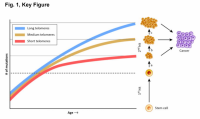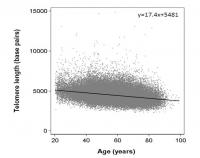Cancer is my most likely cause of death
Short telomeres in old age cause mutations; mutations cause cancer.
Cancer is rarely fatal at its original site. It's the metastases spreading everywhere that kills.
The discoverer of the "Hasini effect" found that tumor cells migrate when inflammatory cytokines reaches a critical concentration inside their tumor.
In old age, the main source of inflammatory cytokines is senescent cells. Unfortunately, most senolytics that kill these cells cause a lot of collateral damage. It seems to me that of the people that have taken them have increased their epigenetic age by doing so.
Two ways to reduce senescent cells without senolytics have been demonstrated. 1) thymus regeneration and 2) epigenetic-age reduction.
-
Greg Fahy showed that regenerating the thymus gland greatly reduces senescent cells. If you live in California, you might be able to join his next thymus regeneration trial. (He uses about $15,000 of hgh per patient, provided free). His thymus regeneration also doubled LMR (leucocyte/monocyte rato) calculated from an inexpensive CBC (complete blood count). So you can test thymus regeneration with a CBC.
-
Mice thymus glands were rejuvenated by large amounts of melatonin in their food. I'm hoping the large dose I take in the evening will work. Next year I'll get a CBC and find out.
-
Harold Katcher showed that when he reduced the epigenetic age of rats their inflammatory cytokines fell to youthful levels. He and his partner Akshay Sanghvi are hoping to get FDA approval for a trial in humans .In a few years we may be able to get a series of injections from our doctors that rejuvenates nearly everything
-
Turnbuckle's Stem Cell protocol (day 1) appears to lower epigenetic age, but only if telomerase stimulants are avoided. I plan to stop my telomerase simulation in the Fall and find out.
-
Turnbuckle's day 2 senolytic protocol should be unnecessary since lowering epigenetic age should suffice to reduce senescent cells.
I love Turnbuckles idea--stimulate mitochondrial fusion, then 3 hours later take a tsp of C60-in-EVOO and a bunch of amino acids to support stem cell division. Fusion can be stimulated by stearic acid (muffins are nicer than brownies) and PQQ, gynostemma pentaphyllum, leucine, creatine, glutathione, astaxanthin, CoQ10, and vit-C, and fission can be inhibited by disabling Drp1 with sulforaphane.
Edited by RWhigham, 25 May 2020 - 08:26 PM.




























































